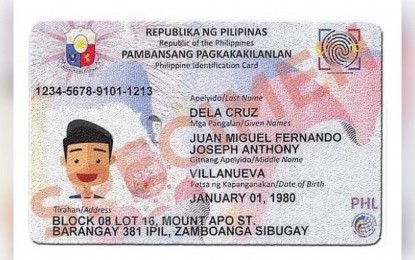
Sample Philippine Identification or national ID (File photo)
MALASIQUI, Pangasinan – The Philippine Postal Corp. (PHLPost) has delivered 622,947 Philippine Identification (PhilID) cards or the national ID to registrants in the Ilocos Region as of March 20 this year.
Based on the data provided by the Philippine Statistics Authority (PSA) Ilocos regional office on Friday, 19,148 PhilID cards were delivered in Ilocos Norte, 159,226 in Ilocos Sur, 179,108 in La Union, and 265,465 in Pangasinan.
“The number includes those returned to sender due to either the registrant having passed away or has moved out of his or her residence,” said PSA Ilocos information officer Jim Ian Bautista in a phone interview.
Bautista said the delay in the delivery of some of the PhilIDs to successful registrants to the Philippine Identification System (PhilSys) might be due to double registration or duplication so they need to validate the records at PSA.
For those who already received their PhilIDs, the PSA is discouraging them from posting these cards online or lending them to other people as they may be copied or falsified, especially the PhilSys number, which is unique to every individual.
Meanwhile, some 142,999 registered in the PhilSys Step 2 in Ilocos as of March 20.
Of the total number, 65,558 were from Ilocos Norte, 28,177 from Ilocos Sur, 23,045 from La Union, and 26,219 from Pangasinan.
Step 2 involves the actual sign-up that includes the validation of demographic information and capture of fingerprint, iris, and face images at the PhilSys registration centers.
Signed into law by President Rodrigo R. Duterte in August 2018, Republic Act 11055, or the Philippine Identification System Act, aims to establish a single national ID for all Filipinos and resident aliens.
The national ID shall be a valid proof of identity that shall be a means of simplifying public and private transactions, enrolment in schools, and the opening of bank accounts.
It also seeks to boost efficiency, especially in dealing with government services where people will only need to present one ID during transactions. (PNA)
